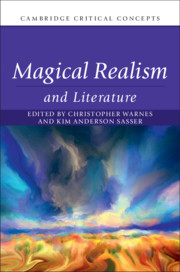Book contents
- Magical Realism and Literature
- Cambridge Critical Concepts
- Magical Realism and Literature
- Copyright page
- Contents
- Contributors
- Introduction
- Part I Origins
- Part II Development
- Chapter 6 Magical Realism and the ‘Boom’ of the Latin American Novel
- Chapter 7 Magical Realism
- Chapter 8 Beautiful Lies
- Chapter 9 Myth, Orality and the African Novel
- Chapter 10 Breaking Boundaries
- Chapter 11 East Asian Magical Realism
- Chapter 12 Magic and Realism in South Asia
- Chapter 13 Fantastic Cohabitations
- Part III Application
- Bibliography
- Index
Chapter 9 - Myth, Orality and the African Novel
from Part II - Development
Published online by Cambridge University Press: 22 October 2020
- Magical Realism and Literature
- Cambridge Critical Concepts
- Magical Realism and Literature
- Copyright page
- Contents
- Contributors
- Introduction
- Part I Origins
- Part II Development
- Chapter 6 Magical Realism and the ‘Boom’ of the Latin American Novel
- Chapter 7 Magical Realism
- Chapter 8 Beautiful Lies
- Chapter 9 Myth, Orality and the African Novel
- Chapter 10 Breaking Boundaries
- Chapter 11 East Asian Magical Realism
- Chapter 12 Magic and Realism in South Asia
- Chapter 13 Fantastic Cohabitations
- Part III Application
- Bibliography
- Index
Summary
African authors have been skeptical of the term ‘magical realism’, as it suggests that their texts are derivative of Latin American writing. This chapter proposes that such concerns over categorization underestimate the shaping force that African magical realist texts have on the concept of magical realism. Further, criticism of magical realism often suggests that the ‘magic’ in magical realism comes from irrational indigenous belief systems and the ‘real’ from the rational West. However, this suggests that Western capitalist modernity is more rational than it really is. Through an analysis of Ngũgĩ wa Thiong’o’s Wizard of the Crow (2006) and Mia Couto’s Sleepwalking Land (2006), this chapter argues that these texts use a combination of written and oral forms to question the rationality of capitalism and in so doing reshape our understanding of magical realism.
- Type
- Chapter
- Information
- Magical Realism and Literature , pp. 148 - 163Publisher: Cambridge University PressPrint publication year: 2020
- 1
- Cited by

